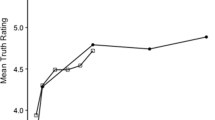Abstract
This paper is about experiments on two versions of ultimatum games with incomplete information, called the offer game and the demand game. We apply the strategy method, that is, each subject had to design a complete strategy in advance instead of reacting spontaneously to a situation which occurs in the game. Game theory predicts very similar outcomes for the offer and the demand games. Our experiments, however, show significant differences in behavior between both games. Using the strategy method, allows us to explore the motivations leading to those differences. Since each subject played the same version of the game eight rounds against changing anonymous opponents we can also study subjects' learning behavior. We propose a theory of boundedly rational behavior, called the “anticipation philosophy”, which is well supported by the experimental data.
Similar content being viewed by others
References
Binmore KG, Shaked A, Sutton J (1985) Testing noncooperative bargaining theory: A preliminary study. American Economic Review 75: 1178–1180
Binmore KG, Shaked A, Sutton J (1988) A further test of noncooperative bargaining theory: Reply. American Economic Review 78: 837–839
Bush RR, Mosteller F (1955) Stochastic models of learning. Wiley, New York
Forsythe R, Kennan J, Sopher B (1991) An experimental analysis of bargaining and strikes with one sided private information. American Economic Review 81: 253–278
Güth W, Ockenfels P, Tietz R (1990) Distributive justice versus bargaining power — Some experimental results. Mimeo, University of Frankfurt
Güth W, Schmittberger R, Schwarze B (1982) An experimental analysis of ultimatum bargaining. Journal of Economic Behavior and Organization 3: 376–388
Güth W, Tietz R (1990) Ultimatum bargaining behavior: A survey and comparison of experimental results. Journal of Economic Psychology 11: 417–440
Harrison GW, McCabe KA (1992) Expectations and fairness in a simple bargaining experiment, Working Paper (Draft # 6), University of South Carolina
Hoggatt A, Selten R, Crockett D, Gill S, Moore J (1978) Bargaining experiments with incomplete information. In Sauermann H (ed.) Bargaining Behavior, Tübingen
Kreps D, Wilson R (1982) Sequential equilibria. Econometrica 50: 863–894
Mitzkewitz M, Nagel R (1991) Envy, greed, and anticipation in ultimatum games with incomplete information: An experimental study. SFB 303, Discussion Paper No. B-181, University of Bonn
Prasnikar V, Roth AE (1992) Considerations of fairness and strategy: Experimental data from sequential games. Quarterly Journal of Economics, forthcoming
Rapoport AM, Kahan JP, Stein WE (1983) Decisions of timing in conflict situations of incomplete information. Behavioral Science 18: 272–287
Rapoport AM, Erev I, Zwick R (1991) Bargaining behavior in a bilateral monopoly with onesided incomplete information. Working paper 91-21, Center for Research in Conflict and Negotiation, Pennsylvania State University
Rapoport AM, Sundali JA, Potter RE (1992) Single stage ultimatum games with incomplete information: Effects of the variability of the pie distribution. Working Paper, University of Arizona
Roth AE (1992) Bargaining experiments. In Kagel J, Roth AE (eds.) Handbook of experimental economics, Princeton, forthcoming
Roth AE, Prasnikar V, Okuno-Fujiwara M, Zamir S (1991) Bargaining and market behavior in Jerusalem, Lubljana, Pittsburgh, and Tokyo: An experimental study. American Economic Review 18: 1068–1095
Selten R (1967) Die Strategiemethode zur Erforschung des eingeschränkt rationalen Verhaltens im Rahmen eines Oligopolexperiments. In Sauermann H (ed.) Beiträge zur experimentellen Wirtschaftsforschung, Tübingen, 136–168
Selten R (1975) Reexamination of the perfectness concept for equilibrium points in extensive games. International Journal of Game Theory 4: 25–55
Selten R (1991) Properties of a measure of predictive success. Mathematical Social Sciences 21 (2): 153–167
Suppes P, Atkinson RC (1960) Markov learning models for multiperson interactions. Stanford University Press, Stanford
Thaler RH (1988) The ultimatum game. Journal of Economic Perspectives 2: 195–206
Author information
Authors and Affiliations
Additional information
We want to express our thanks to Dieter Balkenborg, Kenneth Binmore, Eric van Damme, Werner Güth, Marcin Malawski, Alvin Roth, and Reinhard Selten for helpful discussions and comments. Financial support by the Deutsche Forschungsgemeinschaft (DFG) through Sonderforschungsbereich 303 is gratefully acknowledged.
Rights and permissions
About this article
Cite this article
Mitzkewitz, M., Nagel, R. Experimental results on ultimatum games with incomplete information. Int J Game Theory 22, 171–198 (1993). https://doi.org/10.1007/BF01243649
Received:
Issue Date:
DOI: https://doi.org/10.1007/BF01243649




